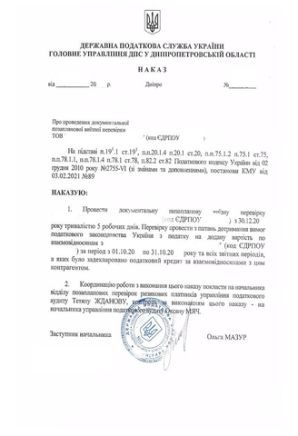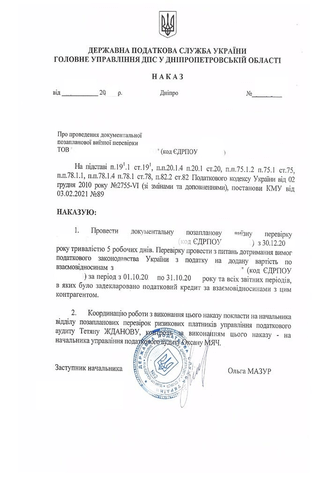Factual tax audit: how to protect yourself from fines?
Cost of services:
Reviews of our Clients
... our work on joint projects assured us of your high level of professionalism
One of the types of tax audits provided for in the Tax Code of Ukraine is a factual inspection. A factual inspection is an audit conducted without prior notice at the location of your actual economic activity or at the location of economic objects owned by you.
Such an inspection can be carried out on any taxpayer, especially those involved in the production, purchase, and sale of excisable goods. Companies and entrepreneurs engaged in the sale of goods and services are particularly targeted.
Agricultural farms and companies engaged in the production and sale of agricultural products are not exempt either, as these enterprises and farms are usually owners of excise warehouses, which is one of the key areas scrutinized during a factual inspection
As a result of a factual inspection, the tax authorities may impose excessive punitive sanctions, especially in cases of violating the legislation related to the use of the cash register and cash discipline. For example, if it is found that you have not used the cash register or have used it in violation of the established requirements, a penalty of 100% of the value of the goods may be applied to you or your enterprise.
Additionally, licenses that were under scrutiny during the factual inspection may be revoked. For instance, the license for storing fuel could be canceled.
You may also like: Can Tax Authorities Be Prevented from Conducting an Inspection?
What issues are examined during a factual inspection?
- Regulations governing the use of cash, and the order of settlement operations.
- Compliance with cash discipline.
- The presence of licenses, and certificates concerning excisable goods.
- Production, purchase, and sale of excisable goods.
- The arrangement of labor relations with employees, and compliance with requirements of the Labor Code of Ukraine.
The most common reasons for conducting a factual inspection are:
- The tax authority possesses information from the results of the inspection of another taxpayer, indicating that your enterprise has violated legislation related to cash discipline, production, and handling of excisable goods, the presence of patents, licenses, etc.
- A written complaint from a customer (consumer) about violations in settlement operations and cash discipline.
- Failure to submit reports on the use of the cash register, accounting books, and settlement books, or the submission of reports with zero values on time.
- And similar cases.
As we can see, the grounds for conducting a factual inspection are specific and differ from other types of inspections, as a factual inspection can be initiated even based on a customer's (consumer's) report of goods/services-related violations.
Is it possible to predict a factual inspection and how to prepare adequately?
It is not feasible to predict a factual inspection in advance because this type of audit is typically conducted without prior notice, taking you by surprise.
However, there is one indicator that may suggest the possibility of an impending factual inspection. This indicator is receiving a request from the tax authority for explanations and/or documents related to the matters mentioned earlier.
Normally, the tax authority's request is sent to the legal address of the taxpayer or the location where business activities are carried out.
Upon receiving such a request from the tax authority, it's crucial to take swift action and seek our assistance. Our team will craft a well-informed response to the request and offer guidance on how to handle the received request, as well as the subsequent steps to prepare for the upcoming factual inspection.
You may also like: Preparing for Tax Audits: How to Get Ready for Inspections?
What role does a tax attorney play in accompanying a factual inspection?
Typically, a factual inspection lasts no more than 10 days, allowing the taxpayer to involve an attorney in the inspection process. During the inspection, as a taxpayer, you will inevitably receive requests for explanations regarding any identified violations and documents listed in such requests.
In practice, tax authorities often demand more than necessary, and having an attorney analyze and respond to these requests during the inspection can help minimize the risks of imposing penalties.
A tax attorney plays a crucial role in presenting objections to the findings outlined in the inspection report when interacting with the tax authority. Additionally, they are instrumental in the administrative and judicial appeal procedures related to tax notices-decisions based on the findings of the factual inspection.
For example, we recently handled a case where the inspection had already concluded, resulting in tax notices-decisions being issued. Our client, a sole proprietorship engaged in the sale of excisable goods (alcoholic beverages), sought assistance to mitigate the consequences of the factual inspection, which included a significant penalty of over 1 million UAH.
We promptly decided to challenge such a tax notices-decision in court. Upon scrutinizing the tax notices-decision and the inspection report's conclusions, it became evident that the inspection report's findings were based on a test purchase. However, we discovered that this test purchase had been conducted in violation of established requirements and, consequently, couldn't serve as the foundation for the inspection report. As a result of the judicial proceedings, the tax notices-decision was annulled.
Moreover, it's worth noting that the client could have saved both time and stress by seeking our assistance at the stage of receiving the initial request.
If you wish to protect your business during a factual tax inspection, please don't hesitate to get in touch with us!
Our clients






